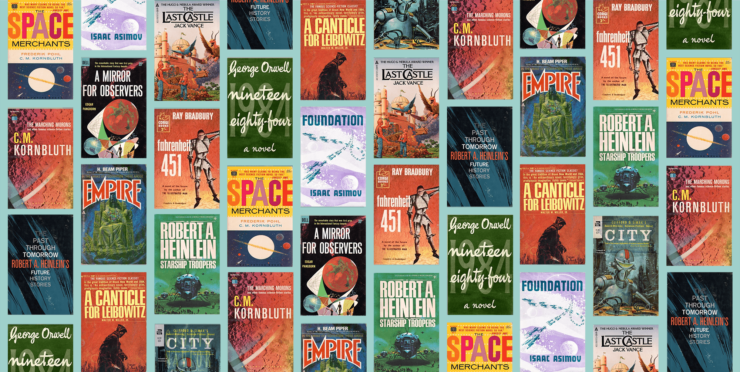As happens from time to time, I recently noticed an author being subjected to complaints that their fiction has an “agenda,” that there are “political elements” in their story, that it touches on society, class, race, culture, gender, and history. As it happens, the calumniated author is one of those younger authors, someone who’s probably never owned a slide-rule or an IBM Selectric. Probably never had ink-well holes in their school desks. Undoubtedly, they may be missing context that I, a person of somewhat more advanced years, can provide.
Golden Age science fiction was, of course, a wonder of agenda-free writing: No political, racial, or gender concerns tainted their deadly deathless prose. Heck, a lot of old-timey SF never so much as hinted that visible minorities or women even existed! Modern authors might find these old-style works inspiring. Perhaps some examples are in order.
(Sadly, there is still no sarcasm font available on this site…)
Young Isaac Asimov, for example, was a self-confessed Futurian, which was a left-wing group. Some Futurians were once banned from WorldCon for their political views. But not Asimov; he was too popular to exclude. Nor did he allow his personal politics to taint his fiction. Consider his Foundation series (1951)—which, as we all know, is about a one-thousand-year effort to covertly place all significant political power in the Milky Way in the hands of a small, secretive elite.
Cyril Kornbluth, also a Futurian, similarly kept his SF utterly free of any political statements of the sort I might have noticed when I was a teenager. Instead, he focused on politics-free entertainment like “The Marching Morons” (1951), a value-neutral story about how sometimes the best solution for life’s challenges is to just kill society’s least-fit 90 percent.
John W. Campbell’s Astounding once bestrode the world of SF fandom like the Colossus of Rhodes, thanks in large part to politically neutral stories like Randall Garrett’s “The Queen Bee” (1958), an amusing tale about compelling women to submit to endless baby-making under frontier conditions (whether or not they want children). Astounding also published H. Beam Piper’s “A Slave is a Slave” (1962), an utterly context-independent story—coincidentally published about the time the American Civil Rights movement was underway—which assures the reader that “the downtrodden and long-suffering proletariat aren’t at all good or innocent or virtuous. They are just incompetent (…).” Then there was Heinlein’s “If This Goes On—” (1940), an apolitical tale about freedom-loving rebels confronting an oppressive theocracy. I challenge the pickiest reader to detect any sort of political agenda in these stories!
Galaxy magazine, an Astounding rival, competed for the same audience with its own slate of politics-free stories, like Vance’s The Last Castle (1966), in which effete and ineffective aristocrats struggle to survive the wrath of slaves threatened with a return to their former, quite savage, homeland. It also published Ray Bradbury’s “The Fireman,” in which firemen manfully pursue their duty to rid America of books (this was later expanded into the best-selling novel Fahrenheit 451 [1953]). It published Pohl and Kornbluth’s serial Gravy Planet (later published as The Space Merchants [1952]), in which society enjoys the full benefits of a consumerist society untrammelled by concerns other than the bottom line. Each one of these texts is a gem of transparent storytelling, without the slightest taint of subtext. Or at least they were when teenage me read them…
This careful, purposeful neutrality extended to novel-length works as well: Clifford Simak’s City (1952), for example, details humanity’s long, slow, inexorable decline towards irrelevance and extinction thanks to a long series of well-meaning but unfortunate decisions. I can’t think of any real-world issues this fix-up, composed shortly after the Atomic Bomb made total human extermination a real possibility, could possibly be referencing.
Similarly, Walter M. Miller’s A Canticle for Leibowitz (1959) is a straightforward whizzbanger about monks bravely preserving knowledge in the face of global thermonuclear war for an age when humanity, having learned nothing from radiation-scoured wastelands and centuries of dark ages, might wish once again to make use of said knowledge to lay waste to the world. Modern writers might have ruined the story with intrusive moralizing. Miller comforts the reader with wholesome adventure fare: musings on the morality of euthanasia and the human proclivity to repeat the failures of the past:
Listen, are we helpless? Are we doomed to do it again and again and again? Have we no choice but to play the Phoenix in an unending sequence of rise and fall?
Let tales like those above, and all the works like them—Starship Troopers (1959), A Mirror for Observers (1955), Nineteen Eighty-Four (1949), and so on—stand as examples of the straightforward, uncomplicated, and above all issue-free science fiction authors could craft, if only they tried.
In the words of Wikipedia editor TexasAndroid, prolific book reviewer and perennial Darwin Award nominee James Davis Nicoll is of “questionable notability.” His work has appeared in Publishers Weekly and Romantic Times as well as on his own websites, James Nicoll Reviews and Young People Read Old SFF (where he is assisted by editor Karen Lofstrom and web person Adrienne L. Travis). He is currently a finalist for the 2020 Best Fan Writer Hugo Award and is surprisingly flammable.










